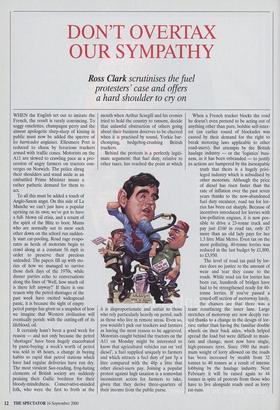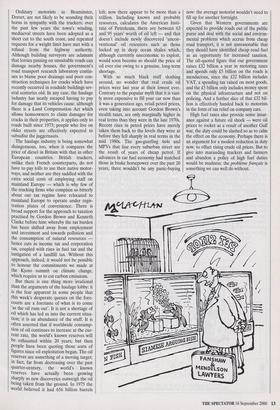DON'T OVERTAX OUR SYMPATHY
Ross Clark scrutinises the fuel
protesters' case and offers a hard shoulder to cry on
WHEN the English set out to imitate the French, the result is rarely convincing. To soggy omelettes, champagne perry and the almost apologetic slurp-slurp of kissing in public must now be added the spectre of les barricades anglaises. Ellesmere Port is reduced to chaos by ferocious truckers armed with traffic cones. Motorists on the All are slowed to crawling pace as a pro- cession of angry farmers on tractors con- verges on Norwich. The police shrug their shoulders and stand aside as an embattled Prime Minister issues a rather pathetic demand for them to act.
To all this must be added a touch of Anglo-Saxon angst. On this side of La Manche we can't just have a popular uprising on its own; we've got to have a full- blown oil crisis, and a return of the spirit of the Blitz to boot. Mums who are normally out to mow each other down on the school run sudden- ly start car-pooling. Road rage evapo- rates as herds of motorists begin to crawl along at a constant 56 mph in order to preserve their precious unleaded. The papers fill up with sto- ries of how we managed to survive those dark days of the 1970s, while dinner parties echo to conversations along the lines of 'Well, how much oil is there left anyway?' If there is one reason why the petrol shortages of the past week have excited widespread panic, it is because the sight of empty petrol pumps has given us a snapshot of how we imagine that Western civilisation will eventually perish: with the cutting-off of its lifeblood, oil.
It certainly hasn't been a good week for reason — and not only because the petrol `shortages' have been hugely exacerbated by panic-buying: a week's worth of petrol was sold in 48 hours, a change in buying habits so rapid that petrol stations which have had regular deliveries have run dry. The most virulent Sun-reading, frog-hating elements of British society are suddenly praising their Gallic brethren for their bloody-mindedness. Conservative-minded folk, who were the first to froth at the mouth when Arthur Scargill and his cronies tried to hold the country to ransom, decide that unlawful obstruction of others going about their business deserves to be cheered when it is practised by sound, Yorkie bar- chomping, hedgehog-crushing British truckers.
Behind the protests is a perfectly legiti- mate argument: that fuel duty, relative to other taxes, has reached the point at which it is disproportionate and unfair to those who rely particularly heavily on petrol, such as those who live in remote areas. Even so, you wouldn't pick out truckers and farmers as having the most reason to be aggrieved. Motorists caught behind the tractors on the All on Monday might be interested to know that agricultural vehicles run on 'red diesel', a fuel supplied uniquely to farmers and which attracts a fuel duty of just 3p a litre compared with the 48p a litre that other diesel-users pay. Joining a popular protest against high taxation is a somewhat inconsistent action for farmers to take, given that they derive three-quarters of their income from the public purse. When a French trucker blocks the road he doesn't even pretend to be acting out of anything other than pure, bolshie self-inter- est (an earlier round of blockades was caused by their demand for the right to break motoring laws applicable to other road-users). But attempts by the British haulage industry — or the 'logistics' busi- ness, as it has been rebranded — to justify its actions are hampered by the inescapable truth that theirs is a hugely privi- leged industry which is subsidised by other motorists. Although the price of diesel has risen faster than the rate of inflation over the past seven years thanks to the now-abandoned fuel duty escalator, road tax for lor- ries has been cut sharply. Because of incentives introduced for lorries with low-pollution engines, it is now pos- sible to drive a 23-tonne truck and pay just £160 in road tax, only £5 more than an old lady pays for her 1.3 litre Mini Metro. Even tax on the most polluting, 40-tonne lorries was reduced in the last budget by £1,800, to £3,950.
The level of road tax paid by lor- ries does no justice to the amount of wear and tear they cause to the roads. While road tax for lorries has been cut, hundreds of bridges have had to be strengthened ready for 40- tonne lorries. If you've passed a coned-off section of motorway lately, the chances are that there was a team resurfacing the inner lane. Large stretches of motorway are now deeply rut- ted thanks to a change in the design of lor- ries: rather than having the familiar double wheels on their back axles, which helped spread the load but were difficult to main- tain and change, most now have single, high-pressure tyres. Since 1980 the maxi- mum weight of lorry allowed on the roads has been increased by stealth from 32 tonnes to 40 tonnes as a result of intense lobbying by the haulage industry. Next February it will be raised again to 44 tonnes in spite of protests from those who have to live alongside roads used as lorry rat-runs. Ordinary motorists in Beaminster, Dorset, are not likely to be sounding their horns in sympathy with the truckers: over the past few years the town's winding, mediaeval streets have been adopted as a short cut to the south coast, and repeated requests for a weight limit have met with a refusal from the highway authority. Although building surveyors are adamant that lorries passing on unsuitable roads can damage nearby houses, the government's road transport research laboratory contin- ues to blame poor drainage and poor con- struction techniques for cracks which have recently occurred in roadside buildings sev- eral centuries old. In any case, the haulage industry has neatly escaped having to pay for damage that its vehicles cause: although there is a Land Compensation Act which allows homeowners to claim damages for cracks in their properties, it applies only to roads built since 1973; people who live on older streets are effectively expected to subsidise the juggernauts.
The haulage industry is being somewhat disingenuous, too, when it compares the price of diesel in Britain with that in other European countries. British truckers, unlike their French counterparts, do not have to pay tolls to use their native motor- ways, and neither are they saddled with the extra social costs of employing staff on mainland Europe — which is why few of the trucking firms who complain so bitterly about our tax regime have relocated to mainland Europe to operate under regis- tration plates of convenience. There is broad support for the approach to taxation practised by Gordon Brown and Kenneth Clarke before him: whereby the tax burden has been shifted away from employment and investment and towards pollution and the consumption of natural resources hence cuts in income tax and corporation tax, coupled with rises in fuel tax and the instigation of a landfill tax. Without this approach, indeed, it would not be possible to honour the commitments we made at the Kyoto summit on climate change, which require us to cut carbon emissions.
But there is one thing more irrational than the arguments of the haulage lobby: it is the fear apparent in some people that this week's desperate queues on the fore- courts are a foretaste of what is to come `as the oil runs out'. It is not a shortage of oil which has led us into the current situa- tion; it is an abundance of the stuff. It is often asserted that if worldwide consump- tion of oil continues to increase at the cur- rent rate, the world's known reserves will be exhausted within 20 years; but then people have been quoting those sorts of figures since oil exploitation began. The oil reserves are something of a moving target; in fact, far from decreasing over the past quarter-century, the world's known reserves have actually been growing sharply as new discoveries outweigh the oil being taken from the ground. In 1975 the world believed it had 656 billion barrels left; now there appear to be more than a trillion. Including known and probable resources, calculates the American Insti- tute of Petroleum, there are between 63 and 95 years' worth of oil left — and that doesn't include newly discovered 'uncon- ventional' oil resources such as those locked up in deep ocean shales which, although currently uneconomic to exploit, would soon become so should the price of oil ever rise owing to a genuine, long-term shortage.
With so much black stuff sloshing around, no wonder that real crude oil prices were last year at their lowest ever. Contrary to the popular myth that it is vast- ly more expensive to fill your car now than it was a generation ago, retail petrol prices, even taking into account Gordon Brown's stealth taxes, are only marginally higher in real terms than they were in the late 1970s. Recent rises in petrol prices have merely taken them back to the levels they were at before they fell sharply in real terms in the mid 1980s. The gas-guzzling 4x4s and MPVs that line every suburban street are the result of years of cheap petrol. If advances in car fuel economy had matched those in brake horsepower over the past 20 years, there wouldn't be any panic-buying now: the average motorist wouldn't need to fill up for another fortnight.
Given that Western governments are expected to provide roads out of the public purse and deal with the social and environ- mental problems which accrue from cheap road transport, it is not unreasonable that they should have identified cheap road fuel as an opportunity for increased taxation. The oft-quoted figure that our government raises £32 billion a year in motoring taxes and spends only £5 billion on the roads is mendacious, since the £32 billion includes VAT, a spending tax raised on most goods, and the £5 billion only includes money spent on the physical infrastructure and not on policing. And a further slice of that £32 bil- lion is effectively handed back to motorists in the form of tax relief on company cars.
High fuel taxes also provide some insur- ance against a future oil shock — were oil prices to rocket as a result of another Gulf war, the duty could be slashed so as to calm the effect on the economy. Perhaps there is an argument for a modest reduction in duty now, to offset rising crude oil prices. But to give into marauding truckers and farmers and abandon a policy of high fuel duties would be madness: the probleme frangais is something we can well do without.



































































 Previous page
Previous page